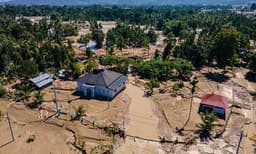Home / Business and Economy / Nusantara, Indonesia's New Capital, Faces Uncertain Future as Funding Plunges
Nusantara, Indonesia's New Capital, Faces Uncertain Future as Funding Plunges
29 Oct
Summary
- State funding for Nusantara project has dropped over 50% since 2024
- Construction has slowed, and few civil servants have moved to the new capital
- Prabowo has downgraded Nusantara to a "political capital" with unclear legal status

As of October 2025, Indonesia's new capital city of Nusantara is struggling to take shape, with state funding for the project plunging more than 50% since 2024. Under the current president, Prabowo Subianto, who took office last October, the annual budget for Nusantara has been slashed from £2 billion in 2024 to just £300 million for the coming year, a third of what was originally requested.
This sharp decline in funding has led to a slowdown in construction, with only around 2,000 civil servants and 8,000 construction workers currently living in the new city, far short of the 2030 target of 1.2 million residents. Prabowo has also quietly downgraded Nusantara's status to a "political capital," although the reasons for this decision remain unclear.
The project's future appears uncertain, with some experts describing Nusantara as a "ghost city" that is "unwilling to live." Local businesses and communities near the new capital have also been impacted, with trade and livelihoods suffering as the influx of workers has dried up. Environmental groups have also raised concerns about the project's impact on the surrounding rainforest and its rare and endangered species.
Despite the challenges, officials involved in the Nusantara project remain optimistic, with the head of the Nusantara Capital Authority insisting that the "funding is there" and the "political commitment is there." However, with the new administration's focus seemingly elsewhere, the future of Indonesia's ambitious new capital remains unclear.



